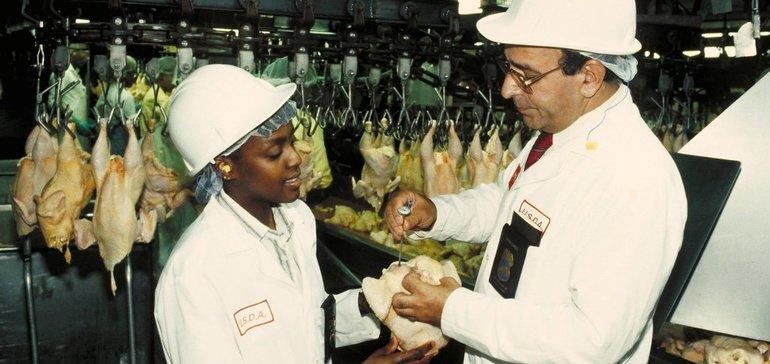As COVID-19 Spreads In Meat Plants, 200 USDA Inspectors Test Positive
Authored by Lillianna Byington of FoodDive,
Summary:
-
A U.S. Agriculture Department spokesperson told Food Dive that 197 field employees in the Food Safety and Inspection Service are absent from work after testing positive for coronavirus and 120 FSIS employees are under self-quarantine due to contact with or exposure to COVID-19 as of May 5.
-
The American Federation of Government Employees, a union representing 6,500 federal food inspectors, said three inspectors have died in Illinois, Mississippi and New York, Meat and Poultry reported.
-
“FSIS has taken the unprecedented step of protecting its employees by allowing those inspectors in high-risk health categories to self-certify with their supervisor and excusing them from inspection duties until the risk from COVID-19 decreases or is mitigated,” the spokesperson told Food Dive. “Additionally, FSIS now has enough masks and face coverings on hand to keep our inspection personnel supplied for the next few months. Despite these numbers our dedicated personnel are still meeting all of their inspection responsibilities so that consumers can continue to enjoy a safe supply of meat and poultry products.”
As coronavirus has spread rapidly among meat plants across the country, it’s not just the workers that are getting infected. Many people have strongly criticized the industry’s response for waiting too long to implement safety precautions and close processing plants as thousands have tested positive for coronavirus and at least 20 workers have died. But the inspectors checking these facilities and their products are not immune to the virus either.
FSIS inspectors are classified as essential workers, so they have continued to travel to monitor these facilities. But as the plants become coronavirus hot spots, reports have shown the inspectors haven’t been able to protect themselves adequately.
A FSIS inspector interviewed in Government Executive said moving inspectors exposed to an outbreak at one plant to another location isn’t safe because they could then be coronavirus carriers and further the spread.
Last month, Politico reported many of the inspectors were expected to find their own protective gear since USDA wasn’t able to secure face masks for all of its workers. In April, USDA said it would give a $50 reimbursement for inspectors to find their own, according to Politico. But now the department says it has enough masks.
Since more than 300 inspectors have either tested positive or self quarantined, that can make it challenging to inspect every plant. Recent closures, however, could make that easier. More than 20 meatpacking plants, including facilities run by Tyson Foods, JBS USA, Smithfield Foods and Cargill, have closed temporarily or indefinitely following pressure from local authorities and their own workforce. But as plants start to reopen, the smaller FSIS workforce could weigh on meat processors.
Two weeks ago, President Donald Trump signed an executive order declaring meat plants as “critical infrastructure” using the Defense Production Act to keep these facilities open and help prevent shortages. But as plants reopen, inspectors will need to travel to them and there is still risk of the virus continuing to spread.
The new executive order puts USDA Secretary Sonny Perdue in charge of coordinating with companies to reopen or continue operations during the pandemic. Perdue previously said he anticipated plants would reopen in “days not weeks.” Already, a major beef and pork plant for Tyson reopened with limited production last week after nearly 900 of its workers tested positive. A Smithfield plant in Sioux Falls, South Dakota, where hundreds contracted the virus, also reopened with limited staff last week.
Several labor groups have criticized the USDA, asking if it can’t protect its own employees from the virus, how can it protect workers? ”The health and safety of federal inspectors and plant workers is in the hands of an industry that the administration is now pressuring to stay open, no matter the costs,” Paula Schelling, acting president of the American Federation of Government Employees Council 45, which represents 6,500 federal food inspectors, said in a release.
While the Centers for Disease Control and Prevention and Occupational Safety and Health Administration created guidelines calling for distancing and other safety measures, there are no requirements forcing companies to reconfigure facilities. And if inspectors continue to catch the virus traveling from plant to plant, they could risk spreading it themselves, or if even more get sick, then there may not be enough inspectors to properly check each facility. It’s just the latest hurdle to challenge the meat industry hit hard during the recent pandemic.
Tyler Durden
Mon, 05/11/2020 – 22:45![]()
Zero Hedge’s mission is to widen the scope of financial, economic and political information available to the professional investing public, to skeptically examine and, where necessary, attack the flaccid institution that financial journalism has become, to liberate oppressed knowledge, to provide analysis uninhibited by political constraint and to facilitate information’s unending quest for freedom. Visit https://www.zerohedge.com
